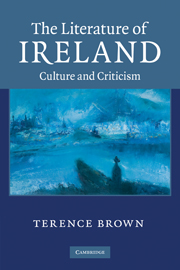Book contents
- Frontmatter
- Contents
- Acknowledgements
- Introduction
- 1 The Literary Revival: historical perspectives
- 2 Joyce's magic lantern
- 3 Music: the cultural issue
- 4 Modernism and revolution: rereading Yeats's ‘Easter 1916’
- 5 Shakespeare and the Irish self
- 6 Irish literature and the Great War
- 7 Ireland, Modernism and the 1930s
- 8 Post-modernists: Samuel Beckett and Flann O'Brien
- 9 Patrick Kavanagh: religious poet
- 10 MacNeice's Irelands: MacNeice's islands
- 11 Louis MacNeice and the Second World War
- 12 MacNeice and the puritan tradition
- 13 John Hewitt and memory: a reflection
- 14 Michael Longley and the Irish poetic tradition
- 15 Seamus Heaney: the witnessing eye and the speaking tongue
- 16 Derek Mahon: the poet and painting
- 17 Telling tales: Kennelly's Cromwell and Muldoon's ‘The More a Man Has the More a Man Wants’
- 18 Redeeming the time: John McGahern and John Banville
- 19 ‘Have we a context?’: transition, self and society in the theatre of Brian Friel
- 20 Hubert Butler and nationalism
- 21 The Irish Dylan Thomas: versions and influences
- Index
- References
13 - John Hewitt and memory: a reflection
Published online by Cambridge University Press: 05 June 2012
- Frontmatter
- Contents
- Acknowledgements
- Introduction
- 1 The Literary Revival: historical perspectives
- 2 Joyce's magic lantern
- 3 Music: the cultural issue
- 4 Modernism and revolution: rereading Yeats's ‘Easter 1916’
- 5 Shakespeare and the Irish self
- 6 Irish literature and the Great War
- 7 Ireland, Modernism and the 1930s
- 8 Post-modernists: Samuel Beckett and Flann O'Brien
- 9 Patrick Kavanagh: religious poet
- 10 MacNeice's Irelands: MacNeice's islands
- 11 Louis MacNeice and the Second World War
- 12 MacNeice and the puritan tradition
- 13 John Hewitt and memory: a reflection
- 14 Michael Longley and the Irish poetic tradition
- 15 Seamus Heaney: the witnessing eye and the speaking tongue
- 16 Derek Mahon: the poet and painting
- 17 Telling tales: Kennelly's Cromwell and Muldoon's ‘The More a Man Has the More a Man Wants’
- 18 Redeeming the time: John McGahern and John Banville
- 19 ‘Have we a context?’: transition, self and society in the theatre of Brian Friel
- 20 Hubert Butler and nationalism
- 21 The Irish Dylan Thomas: versions and influences
- Index
- References
Summary
In June 1972 in a periodical named Alliance, John Hewitt published his poem ‘Neither an Elegy nor a Manifesto: for the people of my province and the rest of Ireland’. It is an impassioned plea that the collective mind of province and country during a time of political violence should pay true respect to the individual victims of the troubles. In the poem the poet eschews the term ‘remember’ since he believes that in Ireland that term comes with a burden of partisanship, ‘a cruel web / threaded from thorn across / a hedge of dead bramble, heavy/ with pathetic atomies’. It is associated too with discredited ‘prayer’, which for Hewitt in this poem is ‘tarnished with stale breath’. Instead of acts of memory and prayer, Hewitt advises ‘Bear in mind these dead’. In the final, eighth, stanza of the poem, the poet ponders the nature of a healthy patriotism (in stanza two he had to a degree indicted a patriotism which is stirred up by rhetorical drumbeats). He asserts:
Patriotism has to do with keeping
The country in good heart, the community
Governed with justice and mercy,
These will enlist loyalty and courage often,
And sacrifice, sometimes even martyrdom.
Bear these eventualities in mind also, they will concern you for ever:
But, at this moment, bear in mind these dead.
(p. 189)- Type
- Chapter
- Information
- The Literature of IrelandCulture and Criticism, pp. 170 - 177Publisher: Cambridge University PressPrint publication year: 2010

